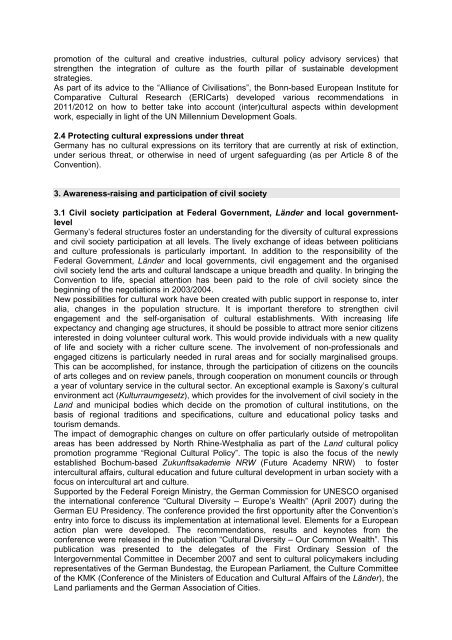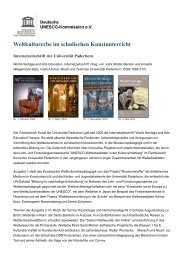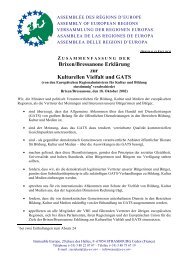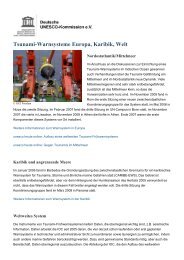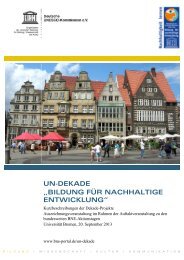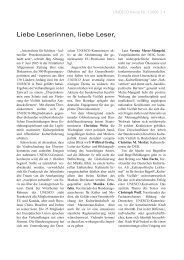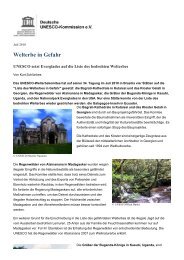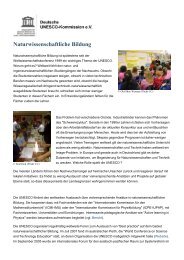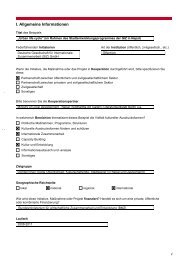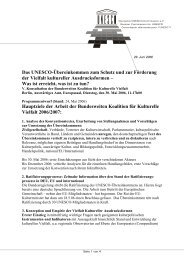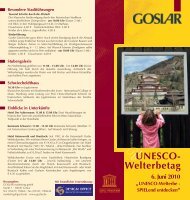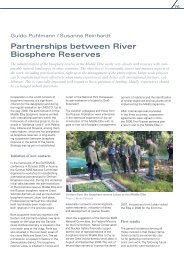Annex Form - Deutsche UNESCO-Kommission
Annex Form - Deutsche UNESCO-Kommission
Annex Form - Deutsche UNESCO-Kommission
You also want an ePaper? Increase the reach of your titles
YUMPU automatically turns print PDFs into web optimized ePapers that Google loves.
promotion of the cultural and creative industries, cultural policy advisory services) that<br />
strengthen the integration of culture as the fourth pillar of sustainable development<br />
strategies.<br />
As part of its advice to the “Alliance of Civilisations”, the Bonn-based European Institute for<br />
Comparative Cultural Research (ERICarts) developed various recommendations in<br />
2011/2012 on how to better take into account (inter)cultural aspects within development<br />
work, especially in light of the UN Millennium Development Goals.<br />
2.4 Protecting cultural expressions under threat<br />
Germany has no cultural expressions on its territory that are currently at risk of extinction,<br />
under serious threat, or otherwise in need of urgent safeguarding (as per Article 8 of the<br />
Convention).<br />
3. Awareness-raising and participation of civil society<br />
3.1 Civil society participation at Federal Government, Länder and local governmentlevel<br />
Germany’s federal structures foster an understanding for the diversity of cultural expressions<br />
and civil society participation at all levels. The lively exchange of ideas between politicians<br />
and culture professionals is particularly important. In addition to the responsibility of the<br />
Federal Government, Länder and local governments, civil engagement and the organised<br />
civil society lend the arts and cultural landscape a unique breadth and quality. In bringing the<br />
Convention to life, special attention has been paid to the role of civil society since the<br />
beginning of the negotiations in 2003/2004.<br />
New possibilities for cultural work have been created with public support in response to, inter<br />
alia, changes in the population structure. It is important therefore to strengthen civil<br />
engagement and the self-organisation of cultural establishments. With increasing life<br />
expectancy and changing age structures, it should be possible to attract more senior citizens<br />
interested in doing volunteer cultural work. This would provide individuals with a new quality<br />
of life and society with a richer culture scene. The involvement of non-professionals and<br />
engaged citizens is particularly needed in rural areas and for socially marginalised groups.<br />
This can be accomplished, for instance, through the participation of citizens on the councils<br />
of arts colleges and on review panels, through cooperation on monument councils or through<br />
a year of voluntary service in the cultural sector. An exceptional example is Saxony’s cultural<br />
environment act (Kulturraumgesetz), which provides for the involvement of civil society in the<br />
Land and municipal bodies which decide on the promotion of cultural institutions, on the<br />
basis of regional traditions and specifications, culture and educational policy tasks and<br />
tourism demands.<br />
The impact of demographic changes on culture on offer particularly outside of metropolitan<br />
areas has been addressed by North Rhine-Westphalia as part of the Land cultural policy<br />
promotion programme “Regional Cultural Policy”. The topic is also the focus of the newly<br />
established Bochum-based Zukunftsakademie NRW (Future Academy NRW) to foster<br />
intercultural affairs, cultural education and future cultural development in urban society with a<br />
focus on intercultural art and culture.<br />
Supported by the Federal Foreign Ministry, the German Commission for <strong>UNESCO</strong> organised<br />
the international conference “Cultural Diversity – Europe’s Wealth” (April 2007) during the<br />
German EU Presidency. The conference provided the first opportunity after the Convention’s<br />
entry into force to discuss its implementation at international level. Elements for a European<br />
action plan were developed. The recommendations, results and keynotes from the<br />
conference were released in the publication “Cultural Diversity – Our Common Wealth”. This<br />
publication was presented to the delegates of the First Ordinary Session of the<br />
Intergovernmental Committee in December 2007 and sent to cultural policymakers including<br />
representatives of the German Bundestag, the European Parliament, the Culture Committee<br />
of the KMK (Conference of the Ministers of Education and Cultural Affairs of the Länder), the<br />
Land parliaments and the German Association of Cities.


